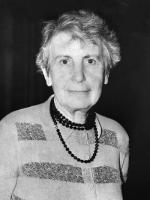Edwin Ray Guthrie: biography of the pioneer in behavioral psychology
Edwin Ray Guthrie (1886 - 1945) was an American mathematician, philosopher and psychologist who developed important theories for behaviorist tradition of the 20th century. Among other things, Guthrie's proposals impacted learning theories and habit modification interventions.
Below we will see a biography of Edwin Ray Guthrie and some of his main contributions to behaviorism.
Edwin Ray Guthrie: biography of the American behaviorist
Edwin Ray Guthrie was born on January 9, 1886 in Lincoln, Nebraska. He was the son of a teacher and a business manager, as well as one of five siblings. He majored in mathematics and later in philosophy and psychology at the University of Nebraska.
In 1912 he earned a doctorate in symbolic logic from the University of Pennsylvania., and two years later he joined the University of Washington, where he developed much of of his professional career as a psychologist, until 1956, which was when he retired definitely.
By the 1930s, Ray Guthrie was already one of the most recognized psychologists in the United States. He had trained under the tutelage of the neuropsychologist Stevenson Smith, from whom he had learned methods of comparative research applied in psychology, as well as tradition functionalism North American.
Likewise, he was trained in the most representative theories of clinical practice of the moment. In fact, in the same decade he translated together with his wife, Helen M. Guthrie, important works for psychotherapy, such as the book Principles of Psychotherapy of the French psychiatrist Pierre Janet, whom they met during a trip to France.
His approach was behaviorist, and since his previous training had been in the hard sciences, Guthrie was convinced that it was possible to develop an objective scientific method to study the mind and intervene in the behavior. Likewise, due to his training in philosophy, much of his theoretical development was argued by principles of the latter discipline. Among other things he developed a principle of association, through which he saw the possibility of linking his learning theory with contemporary research.
Along the same lines, he developed a teaching evaluation system in university faculties, which made it possible for evaluations were more accessible for teachers and students, but also for administrators responsible for salary adjustments, promotions and hiring.
In the year 1945, Ray Guthrie named president of the American Psychological Association, and in 1958 he obtained the Gold Medal from the American Psychological Foundation in the United States. Edwin ray guthrie died on april 23, 1959 in seattle washington of cardiac arrest.
Ray Guthrie's Principle of Association
Guthrie's theory of association is based on the idea that it is contiguity that makes learning possible.. That is, we learn thanks to the closeness between two elements, which in this case are the stimulus and the response. But, unlike classical operant behaviorism, for Guthrie behaviors are not so much responses but movements. The latter are the largest response units and the ones that need to be analyzed if we want to modify behaviors.
Contiguity is established when the set of elements that characterize a stimulus is accompanied by a movement. Guthrie observed that, when faced with similar elements, the movement sequence occurred again, which finally generated a pattern or chain of discrete movements provoked by stimulus signals, which is what he defined as “learning.”
Contributions and differences with operant conditioning
For the behavioral psychology that had been developing until now, One of the essential conditions to generate learning is the presence of a reinforcer, whether positive or negative.. This reinforcer makes it possible for a response to be associated with any stimulus. Furthermore, for this association to be established as a pattern of behavior, it had to be repeated on several occasions.
What Guthrie argued is that this was not necessarily the case. For him, the association could be made through the incidental (non-repetitive) interaction between a stimulus and the response. In other words, for Guthrie, a pattern of behavior can be established from a single trial.
But this did not mean that people acquire complex behaviors by doing them just once. What it suggests is that from the first time there is contact between a stimulus and a response, we exercise a series of body movements that become associated. These are repeated in the face of similar events and are subsequently transformed into complex behaviors.
About changing habits
Edwin Ray Guthrie argued that the main thing was not the reinforcer, in fact, learning did not necessarily have to be achieved by rewarding behaviors. In the same way, The key to modifying behaviors, and specifically habits, is to generate new associations.
The aim would be to detect the primary signals (those that were associated from the first interaction between the stimulus and the response), and implement different behavioral acts, that is, other answers.
Bibliographic references:
- Clark, D. (2005). From philosopher to psychologist: the early career of Edwin Ray Guthrie, Jr. History Psychology, 8(3): 235-254.
- Edwin Ray Guthrie (2018). New World Encyclopedia. Retrieved September 21, 2018. Available in http://www.newworldencyclopedia.org/entry/Edwin_Ray_Guthrie
- Edwin Ray Guthrie (2018). Encyclopaedia Britannica. Retrieved September 21, 2018. Available in https://www.britannica.com/biography/Edwin-Ray-Guthrie

